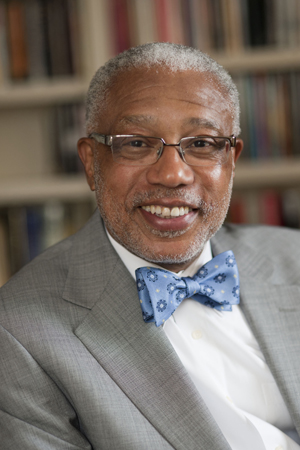What Makes an Ethical Leader?
STH’s Walter Fluker studies Howard Thurman, MLK, and lesser-knowns

Walter Fluker hunts unicorns.
Not the kind with horns. Fluker (GRS’88) uses “unicorns” as a metaphor for those people who exercise innovative moral leadership, people, he says, like Martin Luther King, Jr. (GRS’55, Hon.’59) and the late Marsh Chapel Dean Howard Thurman (Hon.’67). Now the newly appointed Martin Luther King, Jr., Professor of Ethical Leadership at the School of Theology, Fluker wrote his dissertation on both men.
Thurman, the first black dean at a predominantly white U.S. college, led Marsh Chapel from 1953 to 1965. He met Mohandas Gandhi in the 1930s and became an advocate of nonviolence and later an inspiration to King. Fluker has collected and published Thurman’s papers and is teaching a seminar on him this fall. But his search for cutting-edge ethical thinkers often draws him to leaders who aren’t household names, like William George, a Harvard Business School professor and former CEO of medical technology giant Medtronic; Aung San Suu Kyi, a prodemocracy opposition leader in Myanmar; Festus Mogae, a former president of Botswana; Oxford University Islamic scholar Tariq Ramadan; and Ellen Johnson Sirleaf, president of Liberia.
Fluker, educated at Trinity College and Garrett-Evangelical Theological Seminary as well as BU, taught at Morehouse College and led its Leadership Center before coming to BU in September. BU Today talked to him about Thurman, leadership, and unicorns.
BU Today: What can Howard Thurman teach us today about leadership and the religious life?
Fluker: My friend Luther Smith says Thurman’s is spirituality “out on the deep.” By that, he is saying Thurman was trying to answer some deep questions about the relationship of religion and culture. How is spirituality related to social transformation? He believed it would take a movement, rooted in spiritual energy, to stimulate the conscience of the people. When you see the state respond to the Little Rock situation or Brown vs. Board of Education, it’s because the people bring the state to a place where it must respond. For BU students now, what I would hope they would get from Thurman is that the people are a very powerful instrument for change.
You’ve written that ethical leadership requires searching for unicorns. What do you mean?
Laws and penalties by themselves don’t necessarily help people with good behavior. When I’m questing for unicorns, it really is a quest for imagination and feelings. Many leaders, and folks like ourselves, don’t spend much time dealing with our inner lives. What would it look like to see leaders—and there are some—who are acutely conscious of inner needs, inner motivations that are driving behavior?
Who are those leaders?
Bill George talks a lot about the moral compass in leadership. I love David Gergen. He sometimes speaks truth as a public commentator when it’s just very hard to hear. It’s no accident he ends up advising different presidents. I wish he could have gotten a word to Obama early on a lot of things.
Most of my interest is on emerging leaders, those we’ve not met, who are asking hard questions about justice. In China, during the conflict in Tibet some years ago—the monks were being beaten—I’m lecturing on the need for a new generation of leaders who are intellectually astute and morally anchored. At the end, I’m walking out, and this beautiful young lady walks up to me. Very quietly, she takes my hand, and she says, “All that you see is not the way that it really is. But please know, dear sir, I appreciated your lecture.” That was one of the most moving events of my life. I could feel such emphatic energy. That was a unicorn.
How can a university train such leaders?
I’m interested in how we partner with other schools within the University, with the School of Education, with Management, with science. I met the dean of the College of Fine Arts, and we had what I think is an incredible conversation, because the cutting edge of leadership studies tends to be the language that aesthetics brings, that leaders will be deeply intuitive, empathetic.
I conduct training for leaders in government. I’ve done it in Nigeria, South Africa, China, India. I worked with Goldman Sachs.
They could use some ethical training.
I didn’t work with their executives. I worked with the emerging leaders. I don’t know if that’s a disclaimer or not.
Rich Barlow can be reached at barlowr@bu.edu.

Comments & Discussion
Boston University moderates comments to facilitate an informed, substantive, civil conversation. Abusive, profane, self-promotional, misleading, incoherent or off-topic comments will be rejected. Moderators are staffed during regular business hours (EST) and can only accept comments written in English. Statistics or facts must include a citation or a link to the citation.